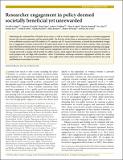Files in this item
Researcher engagement in policy deemed societally beneficial yet unrewarded
Item metadata
| dc.contributor.author | Singh, Gerald G | |
| dc.contributor.author | Farjalla, Vinicius F | |
| dc.contributor.author | Chen, Bing | |
| dc.contributor.author | Pelling, Andrew E | |
| dc.contributor.author | Ceyhan, Elvan | |
| dc.contributor.author | Dominik, Martin | |
| dc.contributor.author | Alisic, Eva | |
| dc.contributor.author | Kerr, Jeremy | |
| dc.contributor.author | Selin, Noelle E | |
| dc.contributor.author | Bassioni, Ghada | |
| dc.contributor.author | Bennett, Elena | |
| dc.contributor.author | Kemp, Andrew H | |
| dc.contributor.author | Chan, Kai MA | |
| dc.date.accessioned | 2019-08-05T15:30:01Z | |
| dc.date.available | 2019-08-05T15:30:01Z | |
| dc.date.issued | 2019-09 | |
| dc.identifier | 260406575 | |
| dc.identifier | c4712552-77ea-4fce-a459-1a6fc47658af | |
| dc.identifier | 85070253436 | |
| dc.identifier | 000479799800001 | |
| dc.identifier.citation | Singh , G G , Farjalla , V F , Chen , B , Pelling , A E , Ceyhan , E , Dominik , M , Alisic , E , Kerr , J , Selin , N E , Bassioni , G , Bennett , E , Kemp , A H & Chan , K MA 2019 , ' Researcher engagement in policy deemed societally beneficial yet unrewarded ' , Frontiers in Ecology and the Environment , vol. 17 , no. 7 , pp. 375-382 . https://doi.org/10.1002/fee.2084 | en |
| dc.identifier.issn | 1540-9295 | |
| dc.identifier.other | RIS: urn:BBAA72BE905C7007E4BD8D7DD1EF6937 | |
| dc.identifier.other | ORCID: /0000-0002-3202-0343/work/75996742 | |
| dc.identifier.uri | https://hdl.handle.net/10023/18250 | |
| dc.description | GGS was supported by NSERC Canada Graduate Scholarship and a Pacific Institute for Climate Solutions doctoral grant, as well as by funding from the Nereus Program; AEP gratefully acknowledges generous support from the Canada Research Chairs program; VFF is partially supported by CNPq grants; EA is supported by the Australian National Health and Medical Research Council (grant ECF1090229); and KMAC is supported by an SSHRC Insight Grant (#435-2017-1071). | en |
| dc.description.abstract | Maintaining the continued flow of benefits from science, as well as societal support for science, requires sustained engagement between the research community and the general public. On the basis of data from an international survey of 1092 participants (634 established researchers and 458 students) in 55 countries and 315 research institutions, we found that institutional recognition of engagement activities is perceived to be undervalued relative to the societal benefit of those activities. Many researchers report that their institutions do not reward engagement activities despite institutions’ mission statements promoting such engagement. Furthermore, institutions that actually measure engagement activities do so only to a limited extent. Most researchers are strongly motivated to engage with the public for selfless reasons, which suggests that incentives focused on monetary benefits or career progress may not align with researchers’ values. If institutions encourage researchers’ engagement activities in a more appropriate way – by moving beyond incentives – they might better achieve their institutional missions and bolster the crucial contributions of researchers to society. | |
| dc.format.extent | 8 | |
| dc.format.extent | 1551812 | |
| dc.language.iso | eng | |
| dc.relation.ispartof | Frontiers in Ecology and the Environment | en |
| dc.subject | H Social Sciences (General) | en |
| dc.subject | NDAS | en |
| dc.subject.lcc | H1 | en |
| dc.title | Researcher engagement in policy deemed societally beneficial yet unrewarded | en |
| dc.type | Journal article | en |
| dc.contributor.institution | University of St Andrews. School of Physics and Astronomy | en |
| dc.contributor.institution | University of St Andrews. St Andrews Centre for Exoplanet Science | en |
| dc.identifier.doi | https://doi.org/10.1002/fee.2084 | |
| dc.description.status | Peer reviewed | en |
This item appears in the following Collection(s)
Items in the St Andrews Research Repository are protected by copyright, with all rights reserved, unless otherwise indicated.

